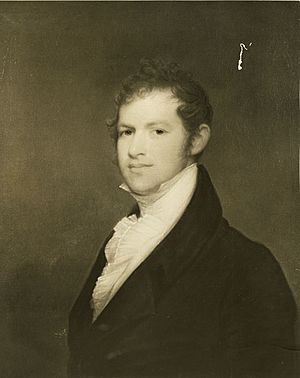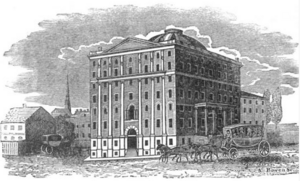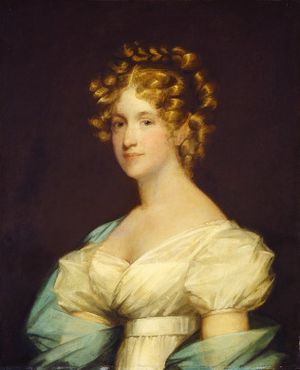Andrew Dexter Jr. facts for kids
Quick facts for kids
Andrew Dexter Jr.
|
|
|---|---|

1808 portrait by Gilbert Stuart
|
|
| Born |
Andrew Dexter Jr.
March 28, 1779 |
| Died | November 2, 1837 (aged 58) |
| Resting place | Oakwood Cemetery, Mobile, Alabama |
| Alma mater | Brown University |
| Occupation | Attorney Businessman Land speculator |
| Years active | 1798-1837 |
| Known for | Commission of one of the first large-scale financial frauds in the United States |
|
Notable work
|
Exchange Coffee House, Boston, Massachusetts |
| Spouse(s) | Charlotte Morton (1787-1819) (m. 1808-1819, her death) |
| Children | 3 |
| Parent(s) | Andrew Dexter (1751-1811) Mary (Newton) Dexter (1757-1825) |
| Relatives | Samuel Dexter (uncle) Simon Newton Dexter (brother) Perez Morton (father-in-law) |
Andrew Dexter Jr. (born March 28, 1779 – died November 2, 1837) was an American lawyer, businessman, and land buyer. He is known for having some big money troubles early in the United States. He also founded the city of Montgomery, Alabama.
Dexter went to Brown University. He became a lawyer for a short time. Then he started working in business and buying land. Around 1805, he had an idea for a huge office building. This building would also have public meeting spaces. He began building the Exchange Coffee House in Boston.
To pay for the building, Dexter created a lot of paper money that wasn't worth much. When people found out about his money problems, he lost control of the building. He left the country to avoid people he owed money to. He later came back from Canada. He lived in New York and tried to fix his money situation. He also worked to pay off his debts.
After his father died, Dexter got the right to buy land in the Yazoo lands. In 1817, he bought many acres of land. This land was along the Alabama River. He started a town there and called it New Philadelphia. When Alabama became a state in 1819, Dexter's town was renamed Montgomery. He lived there and kept trying to succeed in business. But his money situation kept changing with the economy. He died in Mobile, Alabama in 1837. He was almost poor again because of problems from the Panic of 1837. Dexter was buried in Mobile's Oakwood Cemetery. But no one knows the exact spot of his grave.
Contents
Early Life and Education
Andrew Dexter Jr. was born on March 28, 1779. His parents were Mary (Newton) Dexter and Andrew Dexter Sr. His father was a successful merchant. He was also one of America's first cloth makers. Andrew Jr. was born in Brookfield, Massachusetts.
He grew up in Providence, Rhode Island. He graduated from Brown University in 1798. After college, he studied law with his uncle, Samuel Dexter. He then became a lawyer in Boston.
Business Ventures
In the early 1800s, Dexter stopped practicing law. He became involved in business and money matters. In 1807, he started building the Exchange Coffee House. This building was seven stories tall. It was the tallest building in Boston at that time.
Dexter planned for it to have business offices. It would also have reading rooms, meeting rooms, and dining rooms. These spaces would help people meet and do business. He also wanted the Exchange Coffee House to help people know the value of different bank notes. At that time, banks gave out paper money. This money could be traded for gold or silver.
People often traded these notes at a lower value. The value changed based on the bank's reputation. It also depended on how far away the bank was. Money traders in Boston met outdoors to decide these values. Dexter wanted them to move their business indoors to the Coffee House.
To pay for the Exchange Coffee House, Dexter used a system that wasn't regulated. He started or took control of banks far from Boston. These banks were in places like rural Rhode Island, Western Massachusetts, New Hampshire, Maine, and Michigan. He printed much more paper money than these banks had in gold or silver. His plan was to use money from far-off banks in Boston. He hoped no one would try to exchange it for real gold or silver. This meant he could print a lot of money. This would work as long as people didn't suspect there wasn't enough real money to back it up.
In 1807, President Thomas Jefferson stopped trade with Great Britain and France. This was a protest during the Napoleonic Wars. Business in the United States slowed down. People who had bank notes started to trade them for gold or silver. Also, the money traders Dexter wanted to bring indoors stayed outside. So, he didn't get the customers or rent money he expected.
In 1808, some Boston merchants became suspicious of Dexter. A group led by Nathan Appleton told the newspapers. Because of this, stores stopped taking money from Dexter's banks. This meant he couldn't pay his suppliers or workers. Appleton and his friends then paid people to travel around the country. These "runners" would take the bank notes to the banks that issued them. They demanded payment in gold or silver. When the banks couldn't pay, they failed. By 1809, many people knew about Dexter's money problems. He and his wife went to Nova Scotia to avoid legal trouble.
Other investors took over the Exchange Coffee House. It stayed open until a fire destroyed it in 1818.
Later Life and Founding Montgomery
Dexter later moved to Athens, New York. He lived there with his father and brother. They helped him use New York's laws to deal with his debts. This also helped him start rebuilding his finances.
Dexter's father died in 1811. Dexter then got his father's right to buy land at a lower price. This land was in Georgia and what is now Alabama. This was part of the Yazoo lands. In 1817, after the War of 1812, there were land auctions in Milledgeville, Georgia. Dexter bought many acres on the east bank of the Alabama River. This was near a Creek Indian trading post. He started a town there and called it New Philadelphia. When Alabama became a state in 1819, Dexter's town was renamed Montgomery.
Charlotte Dexter, Andrew's wife, died in 1819. This was just weeks after they arrived in Alabama. She likely died from yellow fever. Dexter sometimes raised their three children himself. Other times, he left them with relatives. He worked in farming and buying and selling land. He also tried other things, like buying land in Texas and Mexico. His money situation went up and down with the economy. When he died, he was almost poor again. This was because of the Panic of 1837.
Death and Burial
Dexter died from yellow fever in Mobile, Alabama on November 2, 1837. He was buried in Montgomery's Oakwood Cemetery. But the exact spot of his grave is not known. Attempts to find it have not worked.
Family Connections
Andrew Dexter Jr. was the nephew of Samuel Dexter. He was the brother of Simon Newton Dexter. He was also the son-in-law of Perez Morton and the poet Sarah Wentworth Morton. His son, Andrew Alfred Dexter (1809-1853), was born in Nova Scotia. This was when Andrew Dexter Jr. lived there to avoid his creditors. Andrew Alfred Dexter founded Aiken, South Carolina.
Images for kids
-
1808 portrait by Gilbert Stuart
 | Kyle Baker |
 | Joseph Yoakum |
 | Laura Wheeler Waring |
 | Henry Ossawa Tanner |






